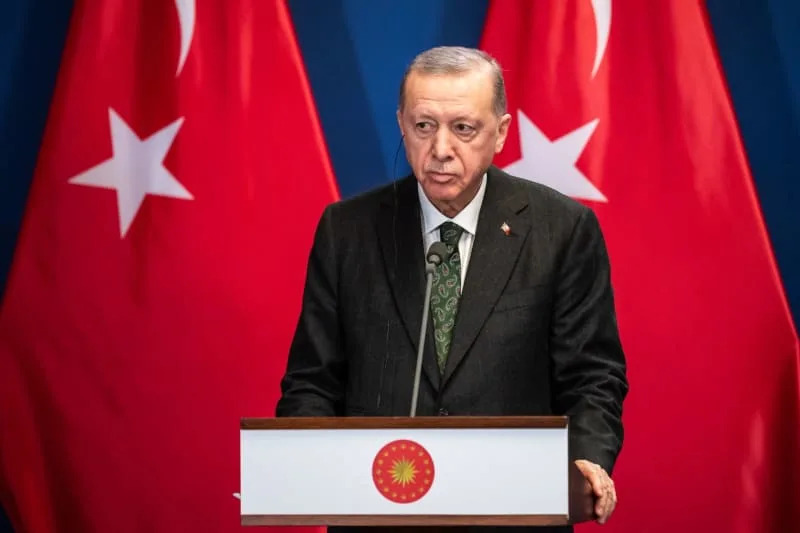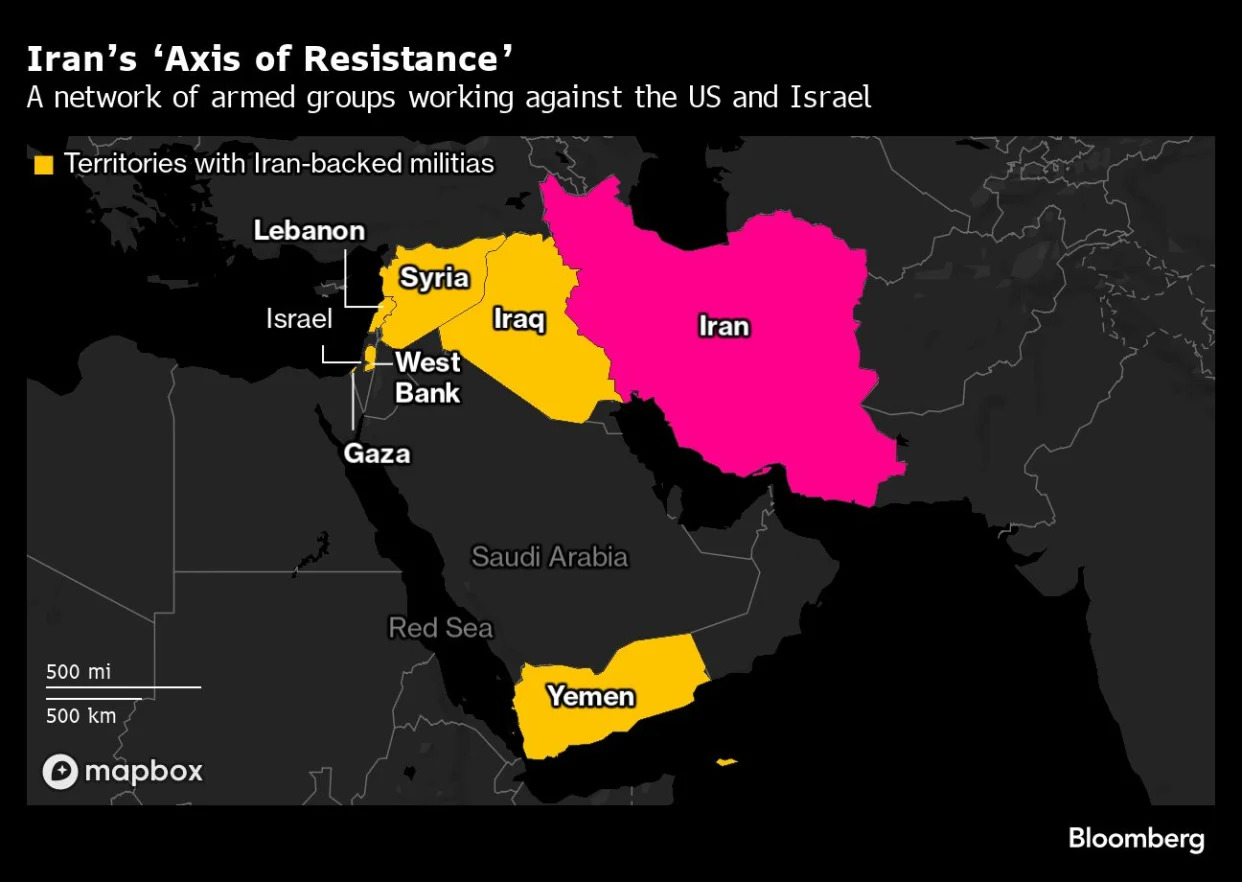Erdoğan condemns US-UK led strikes on Houthis as 'disproportionate'


Turkish President Recep Tayyip Erdoğan condemned the US-UK-led military strike against the Houthi rebels in Yemen as a "disproportionate use of force."
The United States and Britain are "keen to turn the Red Sea into a bloodbath," Erdoğan told reporters in Istanbul on Friday.
The Turkish leader further lauded the Houthis` "very successful defence" against the strikes.
Ankara's NATO allies the United States and the United Kingdom, with support from the Netherlands, Canada, Bahrain and Australia, launched an attack against Iran-backed Houthis overnight in the Red Sea.
It was in response to multiple Houthi attacks on cargo ships in the region.
The operation was carried out in accordance with the UN Charter, an allied joint statement said.
Houthi-US Showdown Is a Watershed Moment for Iran’s ‘Axis of Resistance’

The airstrikes meant to cow Yemen’s Houthi militants are pitting the US and its allies against an Iran-backed movement that senses its moment has arrived after seizing on the Israel-Hamas war three months ago.
It’s also a confrontation that Iran has been scripting in the decades spent assembling what’s been called its “axis of resistance” to Israel and the US. But never before did members of Tehran’s arc of influence — stretching from the Houthis to Hamas and Islamic Jihad in Gaza, Hezbollah in Lebanon to militias in Iraq and Syria — coordinate so well and on such scale.
What happens next rests not just on Iran but also in large part with Houthi leader Abdul Malik Al-Houthi, whose relish for staring down the US leaves little hope the escalation will end here. Taking on the world’s superpower is a step toward fulfilling what the 44-year-old and his followers believe is his fate to become a pan-Islamic ruler, according to almost two dozen people interviewed by Bloomberg, including current and former Yemeni officials.
As the standoff unfolds in a region astride crucial trade routes, Iran is reaping a payoff on its investment in the scrappy mountain rebels who have been enmeshed in civil wars in Yemen since the 1990s.
The Houthis toppled Yemen’s government in 2014, imposing a repressive rule, recruiting child soldiers and embroiling Yemen in a civil war. It’s drawn in regional powers and provoked one of the worst humanitarian crises in a nation that was already one of the poorest in the world.
“Death to America, death to Israel, and a curse upon the Jews,” is the group’s official slogan.
“The Houthis have now become the game changer in the axis of resistance,” said Adnan Al-Gabarni, a Yemeni researcher who has studied the movement. “Iran itself has been surprised by the Houthis’ competence.”
For Tehran, which appears willing to indulge Al-Houthi’s messianic aspirations, the escalation marks a watershed moment in its efforts to nurture allies across the region as a means of projecting power and building a first line of defense against Israel and the US.
The setting for the showdown is the Red Sea, whose two strategic choke points – the Suez Canal in the north and the Bab el-Mandeb strait in the south – provide the conduit for at least 12% of all global trade.
The Houthis’ attacks on vessels over the past two months have exposed the global economy’s vulnerability by wreaking havoc on the shipping world. US President Joe Biden pointed to the threat to “freedom of navigation” in laying out his justification for launching around 70 airstrikes on Houthi targets in Yemen early on Friday.
The military action reverberated in markets, with oil prices rising more than 4%. Brent climbed above $80 a barrel for the first time since late December, before paring its gains slightly.
Iran has succeeded in linking the Houthi movement, officially known as Ansarallah, both ideologically and organizationally with other members of its axis — particularly Hezbollah, according to analysts who’ve studied Tehran’s regional strategy.
Iran does more than provide the Houthis with weapons and transfer missile technology and expertise. Officers from Hezbollah and Iran’s Islamic Revolutionary Guard Corps take part in meetings of the Jihadi Council, which is headed by Al-Houthi and serves as a command and control center, said Al-Gabarni.
Iran’s ability to advance its relationship with the Houthis and then align it with its own goals follows a meticulous blueprint applied with all other regional proxies, says Joel Rayburn, a former US military officer and diplomat.
Rayburn, whose job was to understand Iran’s methods and counter them, says Iraq and Syria offer good comparisons with Yemen. “Iran carves out its client organization, sinks its tendrils deep into it and establishes roots,” he said.
The Houthis’ role in the first fully coordinated actions by the axis after Hamas’ Oct. 7 attacks on Israel succeeded beyond just burnishing their credentials as a potential “second Hezbollah,” said Hanin Ghaddar, a senior fellow at The Washington Institute think tank.
It also helped fulfill something the Lebanese group’s chief, Hassan Nasrallah, has been repeating for years about “achieving unity of arenas and fronts” among axis members.
“They don’t see borders the way we see them,” Ghaddar said. Having the Houthis take such a prominent role since Oct. 7 helps Iran shield Hezbollah from being enmeshed in another full-fledged war with Israel, she said.
The Houthis so far appear undeterred. They warned on Friday that they will not only continue attacking ships in the Red Sea but will now go after “all US and British interests” in the region as “legitimate targets.” Speaking hours before the airstrikes, Al-Houthi vowed resolve.
“We’re patient, God willing, and our people can bear a lot,” he said. “They’re prepared to remain steadfast in their positions for large and long confrontations.”
Coordination in the way Iran’s proxies are acting also opens a new chapter in Israel’s contest with Iran, especially after the Houthis entered the fray by launching long-range missiles and drones directly toward Israel.
“Israel now understands that it can’t target only partners and proxies but must target the one managing the whole front: the Quds Force,” said Yossi Mansharof, a fellow at Israel’s Misgav Institute for National Security and Zionist Strategy. The Quds Force is the IRGC unit responsible for the proxies.
What might act as a key restraint is Iran’s aversion for an all-out war where it risks being outgunned by Israel and the West — alongside the checks on the capabilities of its regional allies.
And despite Al-Houthi’s fiery rhetoric, his movement might ultimately prefer to reap political gains after an eight-year war with rival factions and regional powers like Saudi Arabia and the United Arab Emirates.
“Escalating through this whole ‘unity of fronts’ concept only goes up to a certain limit,” said Hasan AlHasan, senior fellow at the International Institute for Strategic Studies.
- Questions and Answers
- Opinion
- Story/Motivational/Inspiring
- Technology
- Art
- Causes
- Crafts
- Dance
- Drinks
- Film/Movie
- Fitness
- Food
- Games
- Gardening
- Health
- Home
- Literature
- Music
- Networking
- Other
- Party
- Religion
- Shopping
- Sports
- Theater
- Wellness
- News
- Culture
- War machines and policy

